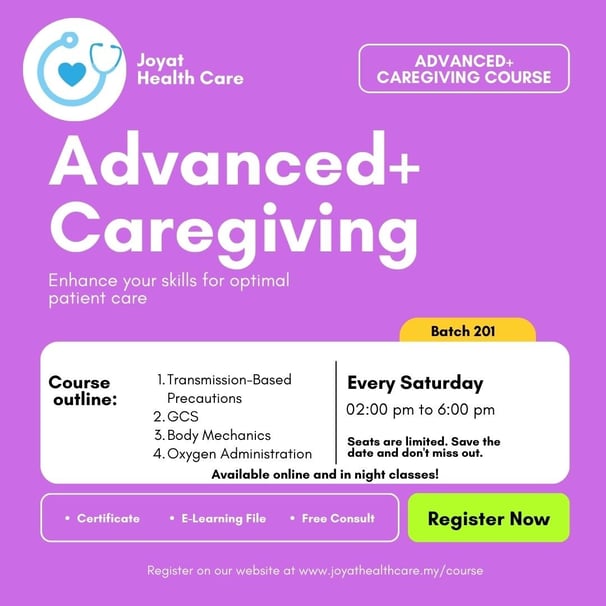JHC Advanced+ 201


Advanced Caregiving+: Flexible Learning for Expert Care
Purpose: This course empowers participants to deliver safer, more effective care while minimising risks to both patients and themselves. It is designed to improve clinical skills, enhance decision-making, and ensure that best practices in healthcare are followed in various patient care scenarios..
Course Details
Schedule: Every Saturday of the month
Duration: 2:00 PM to 6:00 PM (4 hours including breaks)
Location: 88A, Jalan Nb2 1/4, Taman Nusa Bestari 2, 81300 Skudai, Johor
Registration Fee: RM 350 (Includes e-learning materials)
Capacity: 15 participants per session
Certification: Certificate of Achievement upon completion
Participants have the flexibility to complete the course within the month of registration, selecting the best date to suits their schedule.
Course Summary:
This course covers essential topics in healthcare aimed at equipping participants with the knowledge and practical skills necessary for patient care in various settings. Each module provides foundational and advanced understanding of important clinical practices that ensure patient safety, effective treatment, and the prevention of injury to both healthcare providers and patients.
1. Transmission-Based Precautions
Participants will learn about the various precautions required to prevent the spread of infections in healthcare environments. This module covers:
Types of precautions: Contact, droplet, and airborne precautions.
Personal Protective Equipment (PPE): How and when to use masks, gloves, gowns, and goggles.
Isolation protocols: Proper procedures for isolating patients to minimize the risk of cross-contamination.
Learning Outcome: Participants will be able to implement infection control measures to protect themselves and their patients from communicable diseases.
2. Glasgow Coma Scale (GCS)
This module teaches how to assess a patient’s level of consciousness using the Glasgow Coma Scale, a critical tool in emergency care and ongoing patient monitoring.
Understanding the scale: Evaluation of eye, verbal, and motor responses.
Scoring system: How to assign scores based on patient responses.
Clinical application: Using GCS scores to guide treatment decisions, particularly in trauma or neurological conditions.
Learning Outcome: Participants will be proficient in evaluating and documenting a patient’s consciousness level, allowing for timely and appropriate interventions.
3. Body Mechanics
Participants will learn proper body mechanics to prevent injuries when moving patients or heavy equipment. This module focuses on:
Lifting and transferring techniques: Safe methods to move patients from bed to wheelchair or stretcher.
Posture and alignment: Maintaining proper body posture while performing caregiving tasks.
Ergonomics: Tools and techniques to reduce physical strain on the body.
Learning Outcome: Participants will understand how to protect themselves from injury by applying safe lifting and movement techniques, reducing the risk of musculoskeletal injuries.
4. Oxygen Administration
This module focuses on the proper methods of administering oxygen to patients who need respiratory support. Key topics include:
Oxygen delivery systems: Nasal cannulas, face masks, and oxygen tanks.
Indications for use: When and why oxygen therapy is necessary.
Safety precautions: Handling oxygen equipment and preventing fire hazards.
Learning Outcome: Participants will gain competency in administering oxygen safely and effectively, ensuring that patients receive the correct oxygen flow rate based on their clinical condition.
Overall Course Outcomes:
By the end of this course, participants will have the necessary skills to:
Prevent and manage infection through proper precautions.
Assess and document consciousness levels using the Glasgow Coma Scale.
Safely perform patient handling tasks using proper body mechanics.
Administer oxygen therapy to patients in need of respiratory support.
This course is ideal for healthcare workers, caregivers, or anyone involved in direct patient care, providing essential knowledge for both safety and quality in healthcare services.
Address: 88A, Jalan Nb2 1/4,
Taman Nusa Bestari 2,
81300 Skudai, Johor
Telephone: +6016-7613101
Follow us
Joyat Health Care Sdn. Bhd.
(148223-M)
Copyright © 2022
Joyat Health Care Sdn. Bhd. (1482236-M)
All rights reserved*.
For more information, please e-mail us at


